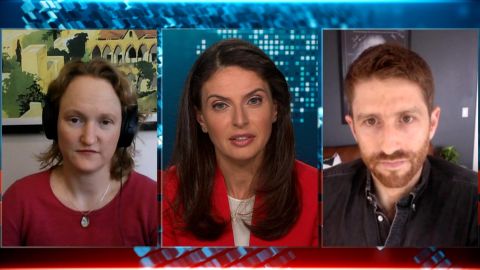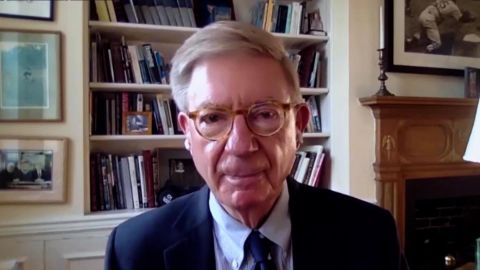Read Transcript EXPAND
BIANNA GOLODRYGA: And you went to jail for that as well. Leo, we appreciate you. Thank you. And “A La Calle” is now streaming on HBO Max. Part of our Warner Media Family. And will be available soon for audiences around the world. And now, we turn back to the United States with big divisive issues like vaccine mandates, abortion laws and the notion of freedom fueling the political divide. Are Americans becoming consumed now by discontent? And what does that mean for the pursuit of happiness? It’s the focus of conservative columnist, Gorge Will’s new book. And here he is talking to Walter Isaacson with insights on resentment in today’s America.
(BEGIN VIDEO CLIP)
WALTER ISAACSON: Thanks, Bianna. And Gorge Will, welcome back to the show.
GORGE WILL, AUTHOR, “AMERICAN HAPPINESS AND DISCONTENTS”: Thank you. I’m glad to be with you.
ISAACSON: Your new collection of essays is called “Happiness and — American Happiness and Discontents.” It kind of reminds me of that phrase the historian, Daniel Boorstin, and others have used about democracy and its discontents. Why are we so hit with discontents these days?
WILL: Well, these days, the traditional American tendency to say we’re not measuring up to our glittering ideals enunciated in the 18th century is aggravated by the fact there seem to be a large number of American who are only happy when they’re unhappy, that they seem to find life affirmed by being furious all the time. I don’t know why.
ISAACSON: You know, you wake up every morning and say how lucky you are, you tend to be happier, right?
WILL: Exactly. And, you know, in the 19th century we were fighting whether one set of human beings could own other human beings and whether slavery should expand into the territories and what to do with public lands and all of that. The grievances today seem to me to be strikingly unsusceptible to amelioration by legislation. I don’t know what you do to assuage the grievances of people who are aggrieved about status, about feeling slighted or condescended to or despised. I don’t know how politics get to hold of those problems.
ISAACSON: Do you think though that the amplification of people’s resentments, the speed of which they travel is at the core of some of this resentment and discontent we feel?
WILL: I do. I think the condition of the Republican Party sort of attests that. The Republican Party is in quite staggering unique position today, in which I think most of the elected officials, certainly in Congress, also in State Houses, most of the elected officials in the Republican Party are terrified of their voters. At least terrified of a significant portion of their voters, the active, intense, compact base of the Republican Party. And if you are terrified of your voters, you don’t like them very much. And if you don’t like them very much, you don’t respect them. Now, that’s a very strange position for a political party to be in. But I think that is where the Republican Party is today, living in total fear of the next sulfuric belch from Mar-a-Lago.
ISAACSON: George W. Bush, former president, on 9/11 gave a pretty amazing speech in which he talked about how our politics has become a naked appeal to anger, fear and resentment. Is that what you are talking about and is that sort of the two polls of the Republican Party, a Bush poll and a Trump poll?
WILL: I don’t think there is much fear involved. I think it’s 98 percent anger. And again, a kind of unfocused furiousness. Some people will not get vaccinated just because other people say get vaccinated. Just a generalized truculence that manifests itself —
ISAACSON: Wait, wait. Explain that to me. Explain that thinking to me.
WILL: Well, I’m not sure it’s a thinking. It’s a reaction against the other side. If the other side is for it, then we’re against it. The shirts and the skins.
ISAACSON: But then, how do we start weaponizing and polarizing normal things like should you take a vaccine?
WILL: Again, it’s the tendency, the political tendency now to define yourself not in terms of what you are for but who you are against. A lot of this is class. A lot of it, again, status anxieties and status resentments. Driven by the fact that some people seem to be thriving much more than others. But America has always had winners and losers. This is different and I don’t quite know why. Again, I don’t want to be a technological determinist here, but the fact that this coincides with the arrival of this, in 2007, the first smartphone arrived and we have been getting dumber ever since.
ISAACSON: Do you — what do you think of Biden’s vaccine mandate?
WILL: I think it’s either illegal or unconstitutional.
ISAACSON: But is it wise?
WILL: It’s a wise aspiration and I understand his impatience. But the constitution, particularly and the rule of law, in general, requires patience. What I meant by it’s illegal if the Congress did not intend to grab these extraordinary sweeping powers. Powers without, as far as I can tell, a limiting principle to the occupational safety and health administration. It’s unconstitutional if Congress did intend to get them. In which case, it would violate the non-delegation doctrine, but something the court is very reluctant to enforce, but sooner or later has to get back to enforcing, hasn’t really done so for 60 or 70 years. What that doctrine says is that Congress can — in the words of John Rock, Congress can make laws, it cannot make legislators. And what Congress has been doing is yielding, in this case, to OSHA in the eviction case to CDC has been delegating essentially legislative powers to executive agencies at great cost. In this case, A, to separation of powers. But, also, to the principles of federalism.
ISAACSON: Yes, but let’s imagine that Congress, itself, decided to pass a vaccine mandate. Would you think that make sense?
WILL: No. I think such police powers belong to the states, and the states should that. I am all in favor of the states imposing vaccines. And as I recall — it’s been a while since I went to third grade, but as I recall, we were all — we’ve got our chickenpox and measles vaccinations, nothing wrong with that. But, again, the federal government simply does not have those police powers.
ISAACSON: Do you think that private companies should mandate vaccines?
WILL: Yes.
ISAACSON: And how do you think we should get there then if I could be exposed to somebody that decides not to be vaccinated or be a company that decides not to have their employees vaccinated?
WILL: With you I can just tell are vaccinated. And this brings us to one of the problems in President Biden’s recent speech. He said, hey, get vaccinated because it’s safe, effective and free. It’s effective, he kept saying. And he was right to do that. But then he went on about six paragraphs later, and said, what we’re going to do is protect the vaccinated from the unvaccinated. Well, why do we protected from the unvaccinated? The unvaccinated are a terrific threat to themselves, a threat therefore to the healthcare system, to intensive care units and all the rest. But they’re really not a great threat to the already vaccinated.
ISAACSON: So, are you against seatbelt laws and helmet laws for motorcyclists?
WILL: I’m all for them, but it’s up the states.
ISAACSON: Even a federal law then on seatbelts, you would favor?
WILL: No, it’s up to the states.
ISAACSON: OK. On — in Texas now, there is a new abortion law that among other things delegates to ordinary citizens, almost a vigilante way to enforce it. Give me your take on that.
WILL: Well, it’s lunatic. It’s tricky because it’s a slight of hand in order to insulate the law from challenges, because Texas – the state governor of Texas can throw up a (INAUDIBLE) to say, we’re not involved. Sue someone else. The first time, Walter, someone goes for this $10,000 bounty, there will be a suit and it will get to the court and it will be swatted down, I think, promptly. The Texas law is a side show. The big event is coming up in autumn when we have all the arguments in the Mississippi case.
ISAACSON: And what do you think is going to happen there?
WILL: I haven’t a clue.
ISAACSON: And what should happen?
WILL: I’m not sure. It seems to me — this is clear. As Ruth Bader Ginsburg and John Hart Ely at the time that Roe v. Wade was handed down, a very distinguished law professor argued, Roe v. Wade is a terrible constitutional law. It’s barely constitutional law. It is a raw judicial power. You know who really is terrified of Roe v. Wade being overturned, about 8,000 state legislators in this country because all of a sudden Roe v. Wade becomes a regulable activity. I think a lot of Americans who don’t pay close attention to this think if Roe v. Wade is overturned, abortion becomes illegal. No, it doesn’t. It becomes something the states have to decide about. And the legislators, even probably a large number of them who say they want Roe v. Wade overturned are in feeling trepidation that that might happen and they’d actually have to come up with a policy through regular policy-making.
ISAACSON: You say the Texas abortion law with its vigilante enforcement is, I think, lunatic was your word. Do you think the Department of Justice, which tried to file suit to stop it, do you think that makes sense?
WILL: No. Because, again, who are they going to sue? The State of Texas isn’t involved. That’s the trickiness about this. But what conservatives often ask is this, what happens when, say, California says, that’s a neat idea. We’re going to have these private attorney general laws and anyone can sue anyone who is guilty of hate speech or guilty of violating gun control laws as we have them in the State of California. I mean, both sides can play this game and it’s a recipe for even more civic discord than we’ve managed to produce anyway.
ISAACSON: Is there any lesson in the California recall of this week where Newsom won handily?
WILL: Well, there are two lessons. One is, California, thanks to Hiram Johnson, the governor — progressive governor from early 20th century instituted progressive populism. And you want to know what conservatism is, it’s whatever populous isn’t. Populism says, the passions and the desires of the public are clear, self-gratifying and should be translated as directly as possible into public policy. Conservatism says, wrong, wrong, wrong. The fact is public opinion in inchoate. It should be filtered and refined and slowed through representative institutions. So, point number one, the recall, it’s like in golf, you hit a bad shot, you declare a mulligan. The California Electorate wants to say mulligan, and we want to start over on the governor. It seems to me an absent gross turpitude on the part of the office holder. You are stuck with the guy you chose, get over it.
ISAACSON: Now, wait. When you talked about populism and that conservative has been something that tried to temper populism. It seems to me the conservative movement in America has now been, in some ways, captured by populism.
WILL: Absolutely. That’s why it’s this being conservator. Because, by the way, this kind of populism translates directly into executive power, which has grown far too large for the constitutional equilibrium of our Madisonian architecture. But I — that was my first point. My second point is this. Walter, it doesn’t matter who is governor of California. It really doesn’t. The governors of California are fungible parts and a large machine run by the public employees’ unions in California. If Mr. Newsom had been recalled and Larry Elder become governor, Elder could say, great, I’m for school choice, and the legislature with Democratic super majorities, veto-proof majorities, would have said, that’s a very interesting opinion but we don’t care. California is even more than most blue states a crystalline model of blue states, the blue model of governors, the public employees’ unions negotiating with their employers.
ISAACSON: You say that populism, in some ways, has captured what used to be the conservative movement in the Republican Party. It’s also there on the Democratic side, a sense of populism, anti-elite, anti-establishment. You know, in American history, populism hasn’t had a great run, at least since Andrew Jackson. I mean, it’s the last time you had an outright populous elected president and yet, both parties are becoming more populous. Why is that?
WILL: It’s easy. That is no one ever really got in trouble in America by saying that the people are wise and should go what they want as soon as possible. Of course, that calls back to mine — H. L. Mencken’s definition of democracy, which is the belief of the people know what they want, deserve to get it good and hard. If we’ve had one great successful populist in — from your State of Louisiana. Huey Long translated populism into a political regime that is pretty close to have been police state for a while in Louisiana. Not pretty.
ISAACSON: Do you think this type of populism with an authoritarian tinge has peaked in the Republican Party as well and that people like George Bush or Paul Ryan are able to push back at it?
WILL: Not yet. Not nearly yet. The question is, Donald Trump is an entertainer. And the one thing an entertainer can’t be is boring and predictable. He has one pedal on the organ and he has worked it now for 20 years. Really, to be fair to him, it used to be that Japan was going to run all over us. Now, it’s China. And it’s — but these are minor tweaks to his basic message. And I think we may be rescue by boredom. The wonderful human capacity. And we may be the only creatures who have the wonderful human capacity to get bored. And I think Donald Trump was on the way to becoming a bore.
ISAACSON: There is a protest coming up this weekend and it has caused a fence to go back around the capitol. What do you make of that and how do we protect our capitol while still, you know, exulting our democracy?
ISAACSON: Well, that fence is an obscenity. And whoever put it up should be fenced in and rolled up with it and carted away. The idea with the United States should look like a nervous Banana Republic with a capitol constantly trembling because there is a rest of tank regiment at the edge of town. I mean, what kind of people are w that we think we have to? I think the United States capitol is the greatest secular building in public use in the world. It’s a magnificent building. And it’s the epicenter of our democracy. And the idea that whenever a group of angry people come to Washington we have to pretend as though it has to be fortified. Well, my good lord, if the police aren’t better at controlling the crowds in that, change the police.
ISAACSON: But you saw what happened on January 6th.
WILL: Exactly. And because it happened on January 6th, we know to be alert to it and prevent it. That’s not an excuse. January 6th is not an excuse for making us look like an embattled armed camp.
ISAACSON: But do you blame some of the politicians, including Trump, that seem to, you know, excite people?
WILL: Of course. Of course. He incited that riot. I blame him. Of course. Obviously, he incited it. He did it on television. We all watched it. I watched every minute of that day. Paul Ryan and others did. Paul Ryan told me that his response was he wept to see this happen to that great building.
ISAACSON: So, why are people inciting again so that we have more of these things happening this weekend?
WILL: Because they’re morons and because they’re irresponsible. That’s why. But again, the fact that these people do these things is not an excuse for making this — Washington look like a fragile brittle capitol. It’s neither.
ISAACSON: Gorge Will, as always, thank you for joining us
WILL: I enjoyed, Walter. Let’s do it again.
About This Episode EXPAND
Angela Povilaitis; Georgia Wells; Tristan Harris; Leopoldo López; George Will
LEARN MORE



